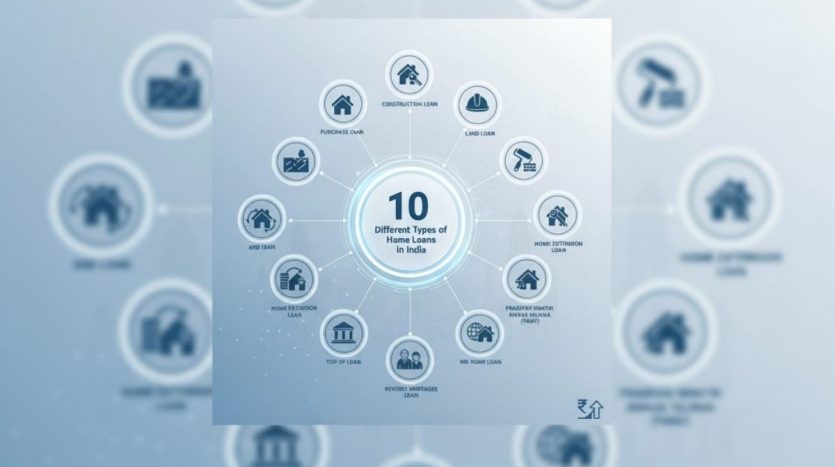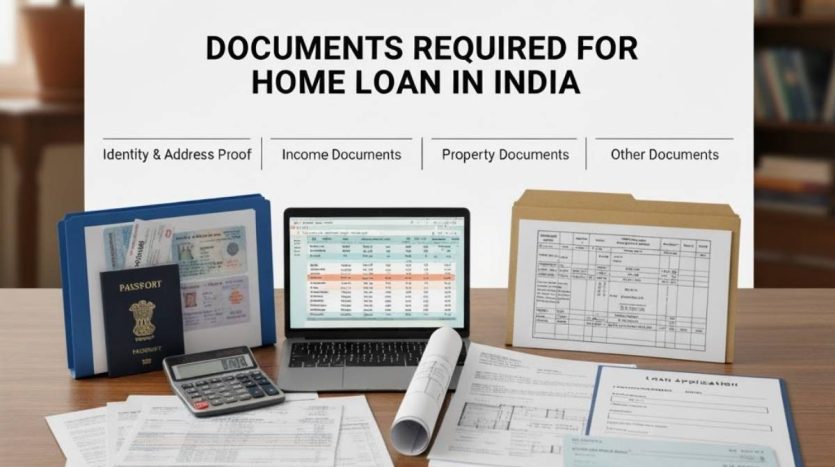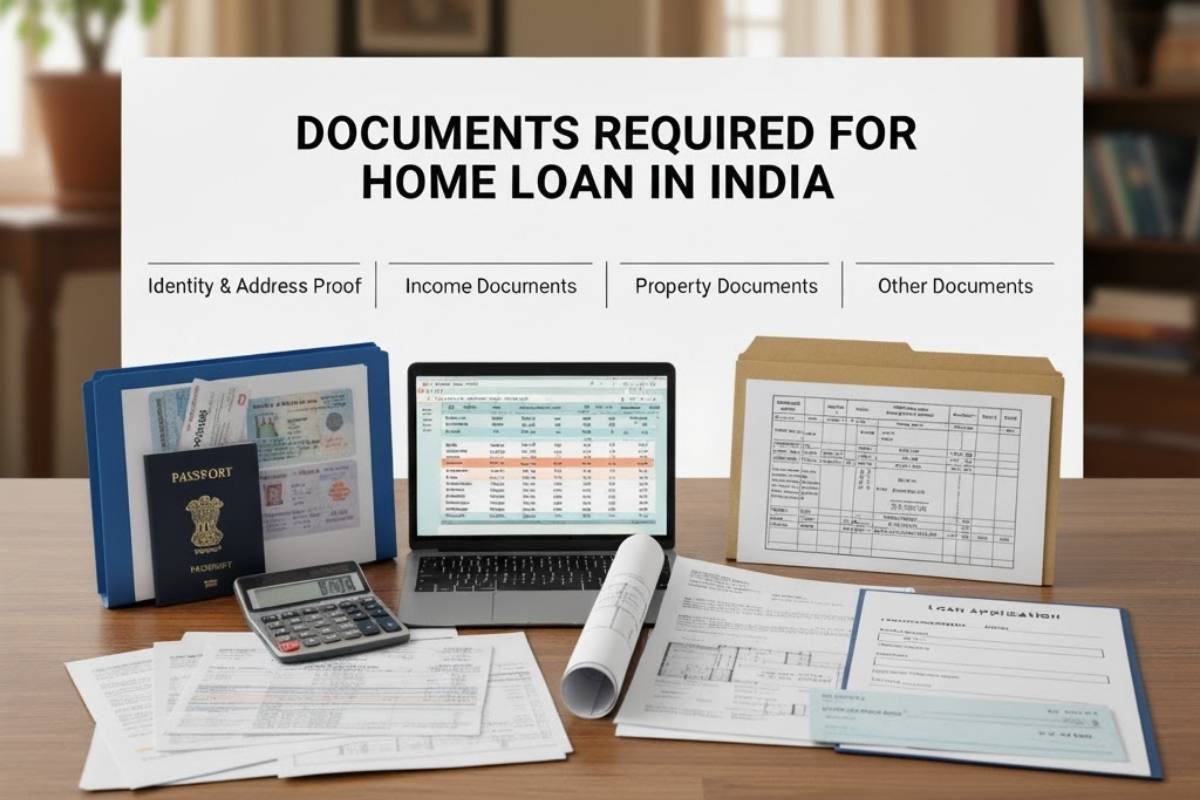Different Types of Home Loans in India You Must Know
Introduction
Buying a home is exciting, but figuring out the right home loan can be confusing. With so many options available, it’s easy to feel overwhelmed. Whether you’re purchasing a ready-to-move property, building a house, or renovating your current space, there’s a specific loan designed for each purpose. In this blog, we’ll explore the different types of home loans in India that every homebuyer should know. From standard purchase loans to more specialised options, you’ll get a clear picture of what’s available so you can make a smart, confident choice for your dream home. Let’s get started.
10 Different Types of Home Loans in India
Buying a home is one of the biggest dreams for many Indians. With real estate prices rising steadily, a home loan has become the go-to solution to help people purchase their dream property. But did you know there are different types of home loans in India, each tailored to a specific purpose?
Whether you’re building a house, buying a plot, or renovating your current home, choosing the right loan can save you money and effort. Let’s break down the 10 major types of home loans available in India, so you can make a smart and confident decision.
What Is a Home Loan?
A home loan is a financial product offered by banks or housing finance companies to help individuals purchase or build residential property. The loan amount, interest rate, and tenure depend on your income, credit score, and the value of the property.
Why Understanding Home Loan Types Matters
Different goals require different types of financing. Choosing the right type of home loan ensures you:
- Get better interest rates.
- Match the loan to your property needs.
- Maximise tax benefits
- Avoid unnecessary costs or delays.
Now, let’s explore the 10 most common types of home loans in India.
Home Purchase Loan
This is the most common home loan used to buy a ready-to-move-in or under-construction property.
Highlights:
- Covers up to 80-90% of property value
- Available for salaried and self-employed individuals
- Competitive interest rates
Home Construction Loan
Planning to build your own house on a plot you already own? A home construction loan is what you need.
Features:
- Funds disbursed in phases, based on construction progress
- Requires a detailed construction plan
- Ideal for self-designed homes
Home Improvement Loan
This loan is used to renovate or upgrade your existing home, whether it’s new flooring, a modular kitchen, or a fresh coat of paint.
Advantages:
- Lower interest than personal loans
- Can claim tax benefits
- Great for enhancing property value
Home Extension Loan
Need more space in your house? A home extension loan can help you add another floor, room, or balcony.
Best for:
- Growing families
- Urban homeowners who want to expand instead of buying new
Land Purchase Loan
If you wish to buy a plot of land and build later, a land loan helps you purchase the property first.
Important points:
- Only for residential plots (not agricultural or commercial)
- Can later combine with a construction loan
Composite Loan
A smart choice if you want to buy land and construct on it, this loan combines both needs into one.
Why it’s useful:
- One application and one EMI
- Structured disbursal for both land and construction
- Saves time and paperwork
NRI Home Loan
Designed for Non-Resident Indians looking to invest in Indian property, NRI home loans come with additional documentation.
- Eligibility:
- Valid passport, visa, and overseas income proof
- Residential or rental income is considered.
- Property must be in India.
Balance Transfer Loan
Already have a home loan? You can transfer it to another lender offering lower interest and save big.
Benefits:
- Reduced monthly EMIs
- Better terms and customer service
- Option to top up your loan amount
Top-Up Loan on Home Loan
Need extra funds for personal needs or further home improvement?
Why consider it:
- No need for new documentation
- Lower interest than personal loans
- Flexible usage: education, medical, renovation
Bridge Loan
Planning to upgrade to a new property before selling your current one? A bridge loan fills that gap.
Key features:
- Short-term loan
- Useful when transitioning between two homes
- Higher interest but quick access to funds
How to Choose the Right Type of Home Loan
Buying a home is a big milestone, and often, one of the most expensive purchases you’ll ever make. That’s why choosing the right type of home loan is so important. Whether you’re buying a ready-to-move-in property, building a house, or just renovating your current space, there’s a home loan tailored to your needs.
But with so many types of home loans available in India, how do you know which one is right for you?
In this blog, we’ll walk you through a step-by-step guide to help you choose the ideal loan that suits your financial situation and your homeownership goals.
Understand the Different Types of Home Loans
Before you make a decision, it’s essential to understand the various types of home loans offered by banks and housing finance companies.
Here are the most common types:
- Home Purchase Loan: For buying a new or resale residential property
- Home Improvement Loan: For renovation or upgrades
- Home Extension Loan: To expand your existing home
- Land Purchase Loan: For buying residential plots
- Composite Loan: A combination of land purchase and home construction
- Top-Up Loan: An additional amount on an existing home loan
- Balance Transfer Loan: To transfer an existing loan to another lender for better terms
- NRI Home Loan: For Non-Resident Indians investing in Indian property
- Bridge Loan: Short-term loan for those upgrading from one property to another
Knowing these options helps you match the loan type with your purpose and avoid paying more than necessary.
Assess Your Purpose and Property Type
Ask yourself: What do I need the loan for?
- Buying a new apartment? → Go for a Home Purchase Loan
- Building on a plot? → Consider a Home Construction Loan or Composite Loan
- Planning a kitchen makeover? → A Home Improvement Loan is the way to go
- Looking to invest in land? → Opt for a Land Purchase Loan
Your property type (ready, under construction, plot, or renovation) plays a huge role in deciding the best loan.
Evaluate Your Financial Situation
A loan that looks perfect on paper might not fit your actual financial condition. Always consider:
- Monthly income: Can you comfortably manage the EMI?
- Credit score: A score above 750 gets better interest rates
- Existing liabilities: Other loans or credit card dues
- Down payment ability: Most home loans cover only 75–90% of the property’s cost
Tip: Use a home loan EMI calculator online to estimate monthly payments.
Compare Interest Rates and Loan Terms
Interest rates can make a big difference over time. Even a 0.5% difference can save you thousands!
Look at:
- Fixed vs. floating interest rates
- Loan tenure – Longer tenures = lower EMIs but higher total interest
- Processing fees and other charges
- Prepayment penalties, if any
Always compare rates from multiple lenders before locking in your loan.
Check Eligibility and Documentation
Different types of home loans have different eligibility criteria.
For example:
- NRI home loans require overseas income proof and work permits
- Home construction loans require approved building plans and property documents.
General documents required:
- PAN card, Aadhaar, and address proof
- Salary slips or income tax returns
- Property documents and agreement
- Bank statements (last 6 months)
Having the right documents in place speeds up approval.
Think About Flexibility and Features
Modern home loans offer a range of flexible features, such as:
- Top-up options for future needs
- Balance transfer to reduce the interest burden
- EMI holiday for the first few months
- Step-up EMIs for growing income
Choose a loan that allows you to adapt as your financial needs evolve.
Seek Professional Advice if Needed
Still unsure which type of home loan to pick? Talk to:
- A bank’s loan officer
- A certified financial planner
- An independent loan advisor
They can help you understand hidden charges, compare lenders, and ensure the loan fits your lifestyle and long-term goals.
Documents Required for Home Loan in India
Buying your dream home? Great! One of the first steps is applying for a home loan, and that means getting your paperwork in order.
Whether you’re a salaried employee, self-employed professional, or an NRI, providing the right documents is essential to get your loan approved quickly. Regardless of the many types of home loans available, one thing remains common: documentation plays a major role.
In this blog, we’ll walk you through the key documents required for a home loan in India and help you understand how to stay prepared at every step.
Why Are Home Loan Documents So Important?
Banks and lenders need to verify your identity, income, and the details of the property you’re buying. These documents help them assess your repayment capacity, loan eligibility, and the legal standing of the property.
Submitting complete and correct paperwork upfront helps:
- Speed up loan approval.
- Avoid unnecessary delays
- Build trust with the lender.
- Get better loan terms.
Basic Categories of Required Documents
No matter which of the many types of home loans you’re applying for, whether it’s for buying a new property, building a house, or renovating one, documents typically fall into the following categories:
- Identity and Address Proof
- Income Proof
- Banking and Financial Documents
- Property Documents
- Additional Documents (depending on applicant type)
Let’s break these down further.
Identity and Address Proof
Lenders must verify who you are and where you live.
Commonly accepted documents:
- PAN Card (mandatory)
- Aadhaar Card
- Passport
- Voter ID
- Driving License
- Utility bills (for address proof)
Make sure the documents are valid and up-to-date. For joint home loans, all applicants must provide these.
Income Proof
This is one of the most crucial parts of your home loan application. Your income determines the loan amount, tenure, and interest rate.
For Salaried Individuals:
- Latest 3–6 months’ salary slips
- Form 16 or Income Tax Returns (last 2 years)
- Employment letter or job confirmation
- Employer ID card (sometimes requested)
For Self-Employed Individuals:
- Income Tax Returns (last 2–3 years)
- Balance Sheet and Profit & Loss Statement (CA certified)
- Business registration/license proof
- GST filings or bank statements reflecting business income
Income documentation may vary slightly depending on the type of home loan you apply for.
Bank Statements and Financial History
Lenders will look at your financial habits to judge your repayment capacity.
You’ll need to provide:
- Bank statements (last 6 months, sometimes 12)
- Details of existing EMIs or loans (if any)
- Credit card statements or loan clearance letters, if applicable
Ensure your account shows regular income and responsible financial behaviour.
Property Documents
These confirm the legal status of the property being purchased and form the basis of your home loan.
Key documents include:
- Allotment letter or agreement to sell
- Title deed or sale deed
- Encumbrance certificate
- Property tax receipts
- Approved building plan (for construction loans)
- Occupancy certificate (for ready-to-move homes)
- No Objection Certificate (if applicable)
For different types of home loans, like construction, renovation, or plot purchase, specific property documents will vary slightly.
Other Supporting Documents
Depending on your situation or the lender’s policy, you might also need:
- Passport-size photographs
- Power of Attorney (for NRIs)
- Age proof (birth certificate, school certificate)
- Signature verification (bank letter or passport)
- Loan application form (duly filled and signed)
NRIs and those applying for top-up loans, balance transfer loans, or composite loans may need additional paperwork.
Tips to Keep in Mind
- Double-check for errors: Names, dates, and addresses must match across documents
- Photocopies + Originals: Carry both when visiting the bank
- Organise everything: Keep your documents in a folder, preferably in the order requested
- Ask for a checklist: Every lender has slight variations
Remember, the smoother your documentation, the quicker your loan process.
Tips to Get Your Home Loan Approved Faster
Buying a home is a dream come true, but getting a home loan approved can sometimes feel like a long, stressful process. The good news? With the right approach and preparation, you can speed up your loan approval and move one step closer to owning your dream property.
Whether you’re applying for a home purchase loan, a construction loan, or any of the many types of home loans, these tips can help you avoid delays and improve your chances of quick approval.
Let’s walk through some simple but effective ways to fast-track your home loan approval.
Know the Types of Home Loans Available
Before you even apply, it’s important to understand the different types of home loans and pick the one that fits your needs. Some common options include:
- Home Purchase Loan: For buying a ready-to-move property
- Home Construction Loan: If you’re building a house on your own land
- Home Improvement Loan: For renovation and repairs
- Land Purchase Loan: Ideal for buying a residential plot where you plan to build your own home in the future.
- Balance Transfer Loan: To switch to a lender offering better interest rates
Choosing the correct loan type ensures your application matches your objective, reducing the chance of rejection.
Check Your Credit Score in Advance
Your credit score is one of the first things lenders look at when evaluating a home loan application.
What You Should Do:
- Check your score before applying (CIBIL, Experian, etc.)
- Aim for a score above 750 for better chances and lower interest.
- Clear any unpaid debts or overdue credit card bills.
- Don’t apply for multiple loans at the same time.
A high credit score reflects financial discipline and builds trust with lenders.
Organise Your Documents Properly
One of the most common reasons for loan delays is missing or incorrect documentation.
Essential Documents:
- PAN card, Aadhaar card (for ID and address proof)
- Income proof (salary slips, bank statements, ITRs)
- Employment proof or business documents
- Property documents (sale deed, allotment letter, title deed)
Keep both originals and photocopies ready and neatly organised. Every lender has slightly different requirements, so request a checklist in advance.
Maintain a Stable Income and Job History
Lenders prefer applicants with a stable income source and consistent employment history.
To Strengthen Your Profile:
- Avoid changing jobs right before applying.
- Show a minimum of 2 years of continuous employment.
- If self-employed, show steady profits and filed ITRs for the last 2–3 years.
- Don’t take on new loans or large EMIs during this period.
- Consistency makes you appear as a low-risk borrower.
Apply for a Loan Amount Within Your Eligibility
Applying for a home loan amount that exceeds your repayment capacity is a common reason for rejection.
What You Can Do:
- Use a home loan eligibility calculator online.
- Limit your loan to around 40–50% of your monthly income.
- Opt for a co-applicant (spouse or parent) to boost eligibility.
- Consider a longer tenure if you want lower EMIs
Remember, just because you qualify for a higher amount doesn’t mean you should borrow more than you can repay comfortably.
Choose the Right Lender
Don’t rush into applying with the first bank you find. Different lenders offer different types of home loans, interest rates, and approval timelines.
How to Choose:
- Compare interest rates, processing fees, and customer reviews.
- Check if they offer pre-approved loans for quicker processing.
- Ask about their average approval and disbursal time.
- Look for lenders that allow digital document uploads or doorstep document collection.
Choosing a lender with a fast, transparent process can shave weeks off your timeline.
Avoid Multiple Loan Applications at Once
Applying to multiple banks or NBFCs within a short span may hurt your credit score and raise red flags.
Why You Should Avoid This:
- Each application triggers a hard inquiry on your credit report.
- Multiple inquiries in a short time reduce your credit score.
- Lenders may see you as “credit-hungry” or financially stressed.
Instead, research well and apply to one or two lenders you’re confident about.
Get Pre-Approved for a Home Loan
A pre-approved home loan is one of the best ways to speed up the final approval process.
Benefits of Pre-Approval:
- Shows your seriousness as a buyer
- Let’s you negotiate better deals with property sellers
- Speeds up the final sanction once you finalise the property
- Helps set a clear budget
Most banks offer pre-approvals that are valid for 60–90 days.
Conclusion
Finding the right home loan doesn’t have to be complicated, especially when you understand the options available. Now that you’ve explored the different types of home loans in India, you’re better equipped to choose the one that fits your needs, budget, and property goals. Each loan type serves a unique purpose, and knowing the difference can help you save time, money, and stress in the long run. As you move forward on your journey to owning a home, take a moment to compare, plan, and pick wisely. The right decision today brings you closer to your dream home tomorrow. Have questions or need help choosing the best loan option? Contact us, we’re here to guide you every step of the way.
Frequently Asked Questions
Q1. What are the eligibility criteria for home loans in India?
Ans. Eligibility depends on income, credit score, age, employment status, and repayment capacity. Most lenders require a stable income and a credit score of 750 or above.
Q2. Can I get a loan for home renovation?
Yes, you can apply for a home improvement loan, which covers repairs, upgrades, or remodelling of your existing property.
Q3. Which type of home loan is best for salaried individuals?
Ans. A home purchase loan is ideal, but other types of home loans, like balance transfer or top-up loans, can also benefit salaried applicants.
Q4. Is it possible to get more than one home loan?
Ans. Yes, if your income supports multiple EMIs, you can avail more than one home loan for different properties.
Q5. What is the difference between a land loan and a home loan?
Ans. A land loan is for purchasing a plot, while a home loan is for buying or constructing a house. Terms and interest rates may vary.









